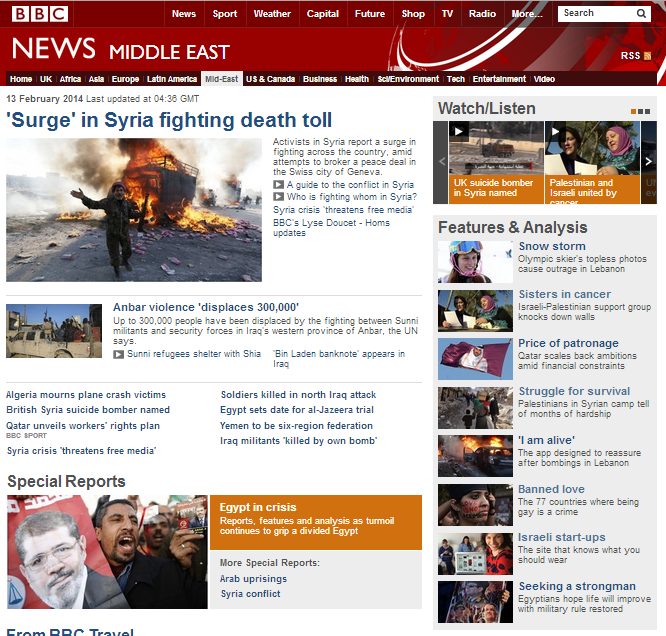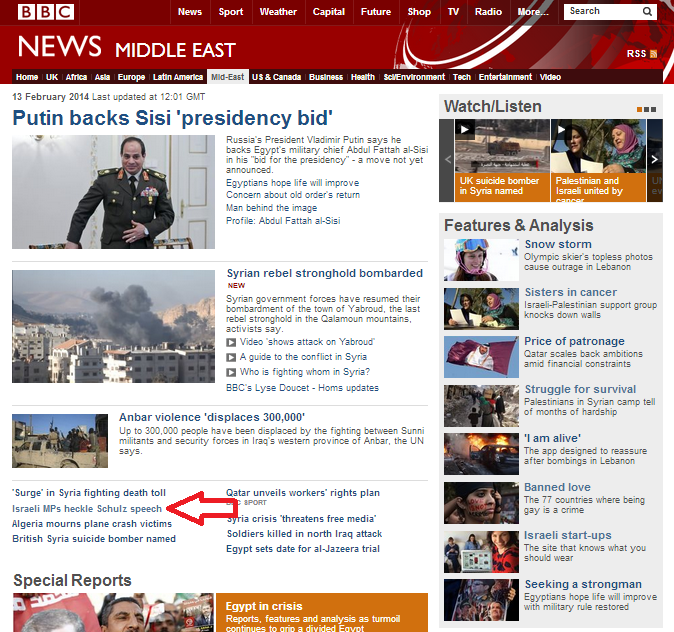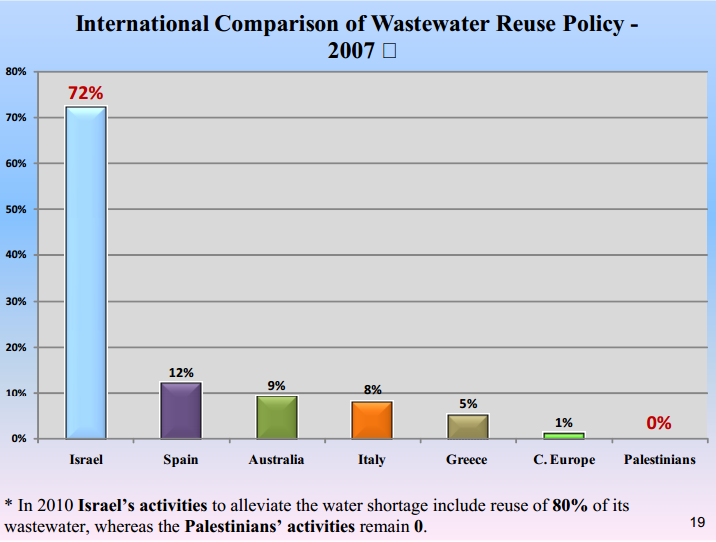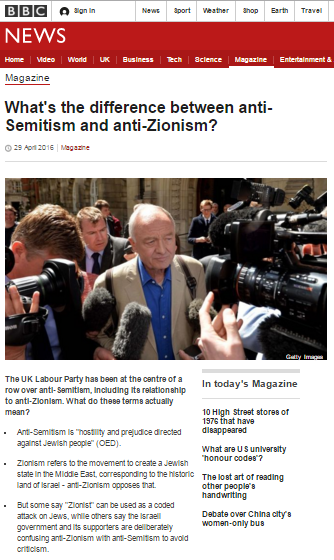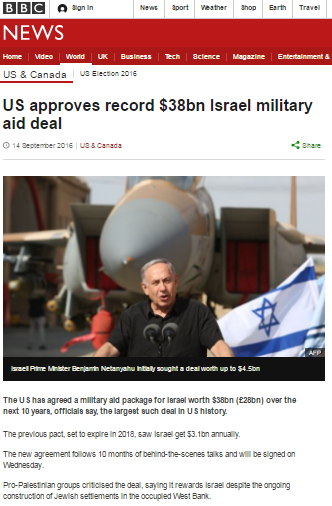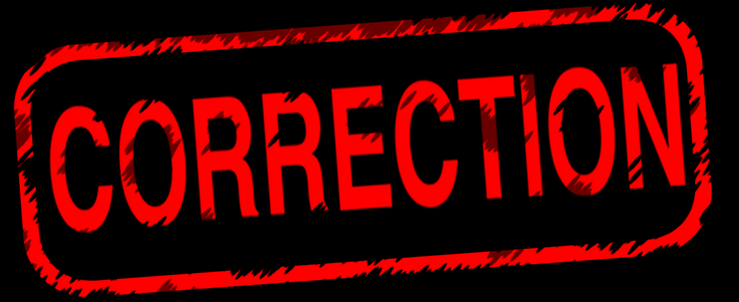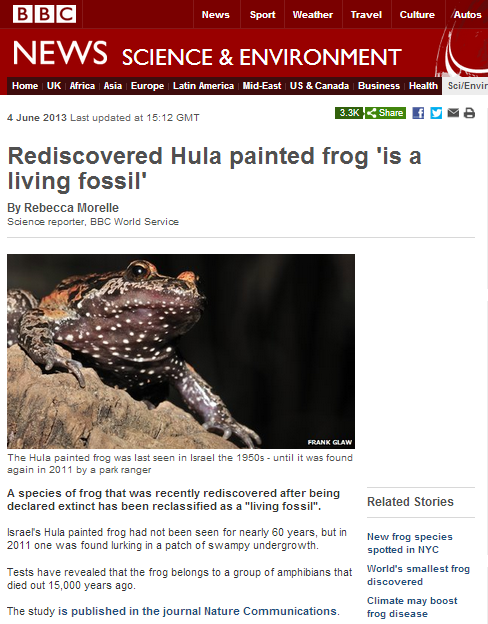On the morning of February 13th the BBC News website’s Middle East page looked like this:
Later on in the day, an article appeared under the heading “Israeli MPs heckle Schulz speech”.
Curiously though, the article to which that link leads is dated February 12th.
The report relates to an incident which took place on that date when the president of the European parliament, Martin Schulz, addressed the Knesset as part of a visit to the region. In his speech, Schulz made some chronologically challenged remarks about the Gaza Strip which are not included in the BBC report.
“The blockade of the Gaza Strip is your response to attacks on Israeli civilians and I can understand that. But it is stifling all economic development and driving people to despair – despair which in turn is being exploited by extremists. The blockade may in fact undermine, rather than strengthen, Israel’s security.”
As is mentioned in this BBC report, prior to that he said:
“Two days ago I spoke with young people in Ramallah. Like young people everywhere in the world, their dream is to train, study and travel, to find work and to start a family. But they have another dream as well, one which concerns something most young people take for granted: they want to be able to live freely in their own country, with no threat of violence, with no restrictions on their freedom of movement. The Palestinian people, like the Israeli people, have the right to fulfil their dream of creating their own viable democratic state. The Palestinians, just like the Israelis, have the right to self-determination and justice.
One of the questions these young people asked me which I found most moving – although I could not check the exact figures – was this: how can it be that an Israeli is allowed to use 70 litres of water per day, but a Palestinian only 17?”
The BBC report goes into considerable detail with regard to the reactions of MKs from the Jewish Home party and the Israeli prime minister to Schulz’s wildly inaccurate and obviously politicised claim, but devotes markedly less effort to informing audiences of the facts behind the issue, instead choosing to make do with the promotion of the claims of a politically motivated NGO as though they were on a par with statistics supplied by an official professional body.
“Israeli newspapers quoted the national water authority as saying the figures quoted by the European Parliament chief were “wrong”, with Israelis receiving 170,000 litres of water per person per year and Palestinians more than 110,000 litres.
However, the Israeli human rights group B’Tselem said last month that per capita water use in Israeli towns – 242 litres – was three-and-a-half times higher than by Palestinians in the West Bank.”
So what are the facts? The BBC – and Schulz –have chosen to deliberately eliminate from the picture the all important basic fact that the issue of water is managed according to the terms laid down in the Oslo Accords, to which the Palestinian Authority was a willing signatory. They also appear to have forgotten that those water agreements were witnessed by the EU among others.
The amount of water Palestinians in PA controlled areas – 97% of the total population – are “allowed” to use (to borrow Schulz’s dubious turn of phrase) is an issue which is under the control of the Palestinian Water Authority – not Israel. The amount of water which Israelis use depends not on an “allowed” quantity, but on the amount for which they are willing to pay.
The section of the Oslo Accords which deals with water and sewage is Article 40 of Appendix 1 of Annex 3 of the Israel-Palestinian Interim Agreement of 1995. That article lays out the responsibilities of both sides and specifies exactly how much water the Palestinians will receive, both by way of their own supplies and from Israel. It includes the following clauses: 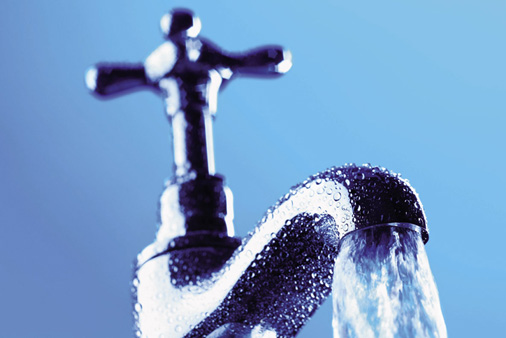
“The Israeli side shall transfer to the Palestinian side, and the Palestinian side shall assume, powers and responsibilities in the sphere of water and sewage in the West Bank related solely to Palestinians, that are currently held by the military government and its Civil Administration, except for the issues that will be negotiated in the permanent status negotiations, in accordance with the provisions of this Article.
The issue of ownership of water and sewage related infrastructure in the West Bank will be addressed in the permanent status negotiations.
Both sides have agreed that the future needs of the Palestinians in the West Bank are estimated to be between 70 – 80 mcm/year.
In this framework, and in order to meet the immediate needs of the Palestinians in fresh water for domestic use, both sides recognize the necessity to make available to the Palestinians during the interim period a total quantity of 28.6 mcm/year […]”
So has Israel met its obligations under the terms of the Oslo Accords? The answer to that question can be found in this document.
“According to the agreement (Article 40) Palestinians are entitled to 196 MCM of self-extracted water per year, plus an additional 31 MCM that Israel needs to actively supply from its own water and with its own infrastructure. Combined, the Agreement states that the Palestinians in the West Bank are entitled to an availability of 227MCM of water.”
“In reality, West Bank Palestinians have access to over 248 MCM of fresh natural water. This is because Israel supplies an extra 21 MCM beyond its obligation (2010 figure). Adding to this, approximately 17MCM of water is extracted through unapproved wells from the Northern and Western Basins, against the Interim Agreement and at Israel’s expense (because the water current naturally flows towards the Israeli side).
This gives us a per capita sum of 124 m3/year without counting unapproved extraction (based on 2010 census).
In comparison, Israel’s per capita sum of fresh natural water is 150 m3/year . (2010 census)”
And has the Palestinian Authority kept its side of the agreement? Details on that can be found in this report.
“The Palestinians constantly breach the agreement, as shown in the following:
1. The Palestinians continuously drill many unauthorized wells in the West Bank, in contradiction to the Water Agreement. Currently there are over 300 unauthorized Palestinian wells in this area, producing additional water on the account of Israel.
2. The Palestinians do not treat their sewage which flows freely in the streams and into Israel, contaminating the environment and the aquifer en route.
3. The Palestinians are not developing any new water source, either through sewage treatment, or desalination (also in contradiction to the Water Agreement).”
It is of course important to appreciate that the Oslo Accords agreements refer only to the supply of fresh water. Israel boosts its own water supply by recycling grey water for use in agriculture and through desalination projects. The Palestinian Authority does not do either of those things and in addition its water losses (through faulty infrastructure and theft of water) stand at around 33.6%.
Not only does the BBC elect to promote six year-old unsourced figures from B’Tselem, but those figures relate to consumption rather than availability. As the Israeli Water Authority notes in a document from 2012:
“According to the table and above mentioned calculations, the domestic consumption is 124 liters/capita/day (88.6 MCM/365 divided by 1.95 million); taking into account the 10% water losses (reasonable figure) the Palestinian consumption is 112 liters/capita/day.
The new Palestinian wells, which are currently being drilled [Ed.- in 2012], will add 10 MCM per year for domestic use. This means that the consumption per capita per day will amount to 138 l/c/d (98.6 MCM/365 divided by 1.95 million residents.) Again, taking into account the 10% water losses the Palestinian consumption will be 124 l/c/d.
The total per capita consumption of the Palestinians amounts to 93 m3/capita/year for all purposes (180.9 MCM/365 divided by 1.95 million residents) which means :254 l/c/d .
The total per capita availability of the Palestinians amounts to 196 MCM/year allocated in the Water Agreement, and an additional 51.5 MCM supplied by Israel. Thus 127 m3/c/y which means 348 l/c/d is available for the Palestinians (not the entire quantity [which] is actually used.)”
So as we see, the BBC has on the one hand amplified Schulz’s grossly distorted statistics and on the other thrown in a few more of its own, but has made no effort to actually present its audiences with concrete facts relevant to the subject rather than propagandised memes. Most importantly, it has failed to clarify to BBC audiences that the issue of water supply to Palestinians in PA controlled areas is the responsibility of the Palestinian Water Authority and that the additional amount supplied by Israel is anchored in agreements signed by the PA.
That will come as no surprise to those familiar with the BBC’s past politicisation of the water issue (see related articles below) but nevertheless, the failure to provide BBC audiences with accurate and impartial information on the claim which is the subject matter of this article means that they are unable to place the reactions of Israeli MKs in context and are no better informed about the issue as a whole than they were before they read this report.
Like Mr Schulz, the BBC could easily have found the relevant information online. Like Mr Schulz, it chose not to and instead opted to promote a pernicious politically motivated myth.
Related Articles:
BBC’s “Obstacles to Peace” do not hold water – part 1
BBC’s “Obstacles to Peace” do not hold water – part 2

